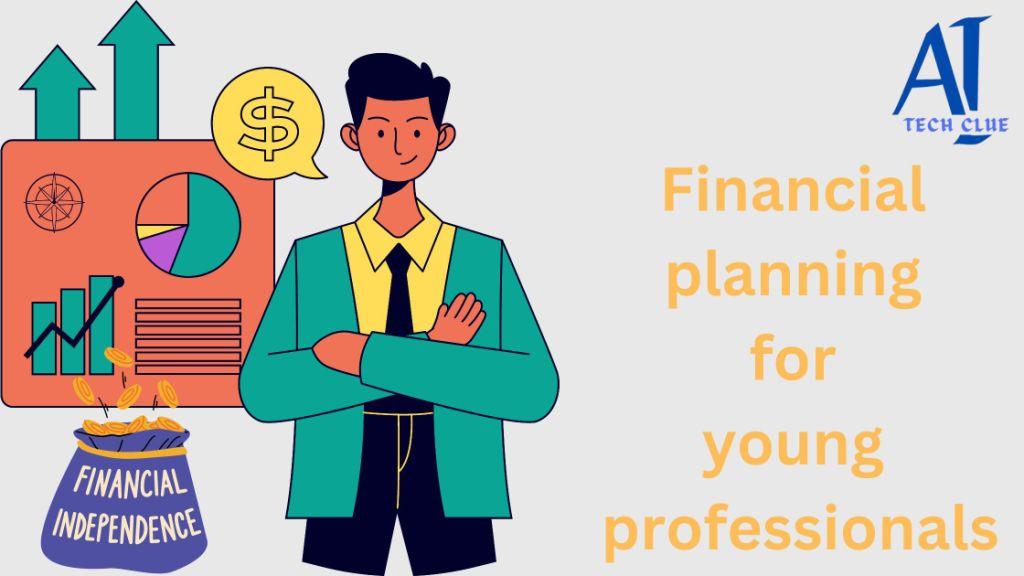Stepping into the workforce is exciting but can be overwhelming, especially when it comes to managing money. Many young professionals find themselves asking, “Where do I start with financial planning?” Financial planning isn’t just for the wealthy or older generations; it’s crucial for young professionals to start building a strong financial foundation early on. But what exactly is financial planning, and why is it so important for young people?
If you want to read same article in hindi click here
What is Financial Planning?
Financial planning is the process of setting goals for your financial future and creating a plan to achieve them. This includes managing your income, savings, investments, and debt, ensuring that you’re on track to meet both short-term and long-term financial objectives.
Why is Financial Planning Important for Young Professionals?
Starting financial planning early can set you up for a lifetime of financial security. As a young professional, you have a key advantage: time. The earlier you start, the more you can take advantage of compound interest and other growth opportunities. Financial planning helps prevent common pitfalls such as accumulating unnecessary debt or failing to save for the future.
Setting Financial Goals
One of the first steps in financial planning is setting clear and achievable financial goals. Your goals will guide every decision you make about money.
Short-Term vs. Long-Term Financial Goals
Short-term goals are typically those that can be achieved within a year, such as saving for a vacation or building an emergency fund. Long-term goals, like buying a house or saving for retirement, may take several years or even decades. Having a mix of both types of goals keeps you motivated and ensures you’re prepared for the future.
The Importance of SMART Goals in Financial Planning
When setting goals, make sure they are SMART—Specific, Measurable, Achievable, Relevant, and Time-bound. For example, instead of saying, “I want to save more money,” a SMART goal would be, “I want to save $500 for an emergency fund in the next 6 months.”
Creating a Budget
Budgeting is the cornerstone of financial planning. A budget helps you track where your money is going and ensures you are spending in line with your goals.
How to Build a Budget from Scratch
Start by listing all your sources of income and your monthly expenses. Categorize your expenses into fixed (rent, utilities) and variable (entertainment, groceries). Subtract your expenses from your income to see how much you have left to save or invest.
Tools and Apps to Help You Track Your Expenses
There are many budgeting apps like Mint, YNAB (You Need a Budget), and PocketGuard that can help automate and simplify the budgeting process. These tools provide insights into your spending habits and can even offer suggestions for saving more.
Understanding Income and Expenses

To manage your finances effectively, it’s important to have a clear understanding of your income and expenses.
Fixed vs. Variable Expenses
Fixed expenses, such as rent, are consistent month-to-month, while variable expenses, like dining out, can fluctuate. Knowing the difference helps you identify areas where you can cut back if necessary.
How to Maximize Your Income Potential
Look for ways to increase your income, whether that’s through salary negotiations, side hustles, or passive income streams. Maximizing your income can help you reach your financial goals faster.
The Importance of an Emergency Fund
Life is full of unexpected events, and an emergency fund is your financial safety net.
How Much Should You Save?
Experts recommend saving 3-6 months’ worth of living expenses in an emergency fund. This cushion will help cover unexpected costs like medical bills or job loss without derailing your financial plan.
Where to Keep Your Emergency Fund
Keep your emergency fund in a high-yield savings account so it’s easily accessible but still earning some interest.
Managing Debt
Not all debt is bad, but managing it wisely is essential to financial success.
Good Debt vs. Bad Debt
Good debt, such as student loans or a mortgage, can be an investment in your future. Bad debt, like credit card debt, often comes with high interest rates and can quickly spiral out of control if not managed properly.
Strategies to Pay Off Debt Quickly
Consider using the snowball or avalanche method to tackle debt. The snowball method involves paying off the smallest debts first to build momentum, while the avalanche method focuses on paying off high-interest debts first to save money over time.
Saving for Retirement Early
It might seem too early to think about retirement, but starting in your 20s can make a huge difference.
Why Start Saving for Retirement in Your 20s?
The earlier you start, the more time your money has to grow. Compound interest allows your savings to grow exponentially over time.
Best Retirement Accounts for Young Professionals
Consider opening a 401(k) through your employer or an IRA (Individual Retirement Account). Both offer tax advantages that can help your money grow faster.
Investment Basics
Investing can seem intimidating, but it’s a key part of growing your wealth.
Understanding Stocks, Bonds, and Mutual Funds
Stocks represent shares of ownership in a company, while bonds are essentially loans you give to a company or government. Mutual funds pool money from many investors to buy a diversified portfolio of stocks or bonds.
The Power of Compound Interest
Compound interest is when the interest you earn on your investments begins to earn interest itself. This snowball effect can significantly boost your wealth over time.
Risk Management and Insurance
Part of financial planning is protecting yourself from risk, and that’s where insurance comes in.
Why Insurance is Part of Financial Planning
Insurance can help cover unexpected costs, like medical bills or property damage, so you don’t have to dip into your savings.
Types of Insurance Every Young Professional Should Consider
Health insurance, renter’s insurance, and disability insurance are all important for young professionals to consider. These types of coverage can protect you from financial ruin in case of unexpected events.
Building and Maintaining Credit
A good credit score is crucial for securing loans, renting an apartment, or even landing a job.
How to Build Credit from Scratch
If you don’t have a credit history, consider opening a secured credit card or becoming an authorized user on someone else’s account.
Tips to Maintain a Good Credit Score
Pay your bills on time, keep your credit utilization low, and check your credit report regularly to ensure there are no errors.
Tax Planning for Young Professionals
Taxes are a fact of life, but smart tax planning can help you keep more of your hard-earned money.
Understanding Income Tax
Familiarize yourself with tax brackets and deductions that apply to your situation. Understanding how taxes work can help you make better financial decisions.
Tax-Advantaged Accounts You Should Know About
Accounts like a 401(k), IRA, and HSA (Health
Savings Account) offer tax benefits that can help you save more effectively for the future.
The Importance of Continuous Financial Education
The world of personal finance is always evolving, so it’s important to keep learning.
How to Keep Learning About Personal Finance
Take time to read financial blogs, listen to podcasts, or even attend workshops. The more you learn, the better equipped you’ll be to make smart financial decisions.
Financial Books, Podcasts, and Blogs to Follow
Books like Rich Dad Poor Dad, podcasts like The Dave Ramsey Show, and blogs like Mr. Money Mustache are great resources for continuing your financial education.
Balancing Lifestyle and Financial Responsibility
It’s possible to enjoy life while still being financially responsible.
How to Enjoy Life Without Compromising Financial Goals
Set aside money for fun activities, but make sure it’s within your budget. Prioritize experiences that don’t cost a lot but still bring you joy.
The Role of Minimalism in Financial Planning
Minimalism encourages you to focus on what truly matters and reduce unnecessary spending. This can free up more money for savings and investments.
Hiring a Financial Advisor
Sometimes, it helps to have a professional guide you through complex financial decisions.
Do You Need a Financial Advisor?
If your finances are becoming more complicated or you’re struggling to meet your goals, a financial advisor can provide valuable insights and personalized advice.
How to Choose the Right Financial Advisor
Look for a certified advisor with a good reputation. Ask for referrals, check credentials, and make sure their services fit your financial needs.
Conclusion
Financial planning is a journey, and the earlier you start, the better off you’ll be. Setting goals, budgeting, investing, and managing debt are all crucial elements to building a strong financial future. By taking control of your finances now, you’re setting yourself up for success and stability in the years to come.
How to Plan Your Investments in Your 30s
FAQs
- How do I start budgeting if I’ve never done it before?
Start by tracking your income and expenses for a month. Use that information to create a budget that aligns with your financial goals. - What’s the difference between a 401(k) and an IRA?
A 401(k) is offered through your employer, while an IRA is something you open on your own. Both offer tax advantages for retirement savings. - How much should I be saving each month?
Aim to save at least 20% of your income. This can be adjusted based on your specific goals and financial situation. - Do I need life insurance as a young professional?
If you have dependents or significant debt, life insurance can provide financial protection in case something happens to you. - What’s the best way to improve my credit score?
Pay your bills on time, keep your credit utilization low, and regularly check your credit report for errors.


1 thought on “Financial Planning for Young Professionals”
Comments are closed.